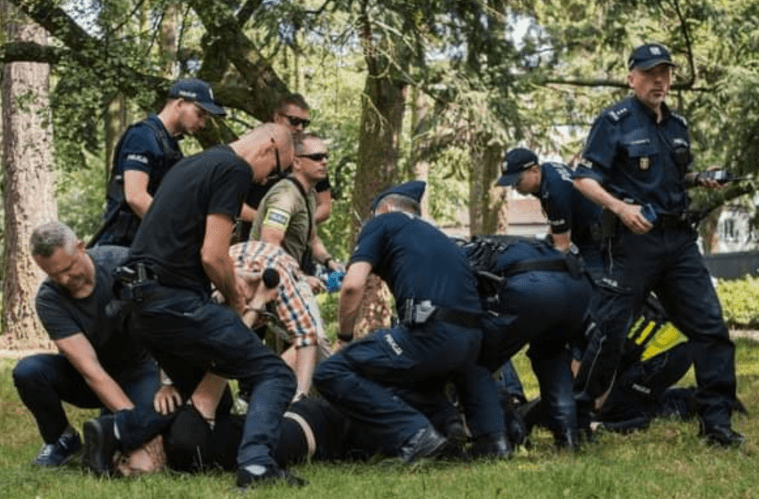Berlin, July 21, 2023 — Polish authorities should investigate the forcible removal by police of freelance photojournalist Maciej Piasecki from a recent climate protest, and allow journalists to work without interference, the Committee to Protect Journalists said Friday.
During a climate protest in Warsaw on Friday, July 14, as police attempted to subdue and detain a protester, a group of six or seven officers forcibly removed from the scene freelance photojournalist Maciej Piasecki, who was on assignment for privately owned news website OKO.press, preventing him from documenting events, according Piasecki, who spoke with CPJ via messaging app, his employer, and other media reports.
The incident, at around 2 p.m., was captured in a video published by OKO.press and corroborated by Piasecki and those reports, which said it occurred during a demonstration in which activists glued their hands to the pavement outside the Ministry of Climate and Environment.
Police removed protesters from the scene by violently apprehending them, according to Piasecki and OKO.press. As Piasecki covered these events live on his TikTok channel, officers shouted to each other instructions to remove him from the scene as well, as seen in video reviewed by CPJ.
Piasecki can be heard saying that he wants to continue covering the events, according to an OKO.press transcript. Police then pushed him aside, and the video shows the police officer grabbing his neck from behind and dragging him toward the ground. Piasecki told CPJ and local media that he did not resist and was not injured, but the officer broke his own leg as they fell to the ground.
A group of seven or eight police then pressed Piasecki to the ground, allegedly twisting his hands, before handcuffing him, confiscating his camera, and taking him to a police station where he was detained for six hours, searched, and questioned in the presence of his lawyer, according to Piasecki and those reports.
“Polish authorities should conduct a swift and transparent investigation into the detention and forcible removal of freelance photojournalist Maciej Piasecki from a recent climate protest and ensure that members of the press can report on events of public interest without police interference,” said Attila Mong, CPJ’s Europe representative. “Journalists deserve police officers’ protection during protests. Unless authorities have something to hide, they must ensure that reporters can cover issues of public interest without fear of police interference.”
The police threatened to press charges against Piasecki for allegedly ignoring their orders and violating the bodily integrity of police officers, but released him without charge, according to OKO.press and Piasecki. He told CPJ and local media that police returned his camera on July 17, and when he collected his equipment, police confirmed to him that no charges would be brought against him.
“The police obstructed my work since the beginning of the protest, despite… the fact that I was wearing my press ID visibly on a lanyard on my neck,” Piasecki told CPJ.
The protesters were rallying against the forced removal the previous day of fellow demonstrators who had maintained a blockade against intensive logging in Poland’s Carpathian Mountains.
“When police earlier asked me to show my credentials, I showed them my card,” Piasecki said, adding that some officers attempted to block his camera’s field of vision as the protesters were met with force. He insists that other than stating his intention to carry on working, he did not resist the officers in any way.
In an email to CPJ, Warsaw Metropolitan Police spokesperson Sylvester Marczak said that authorities would conduct an investigation into the reporter’s detention “to clarify all circumstances.”
